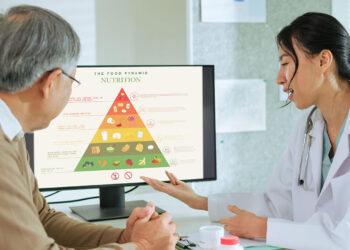Dominic HughesGlobal Health correspondent
 Getty Images
Getty ImagesFor the first time, there are more children in the world who are obese than underweight, according to a major study by children’s charity Unicef.
Around one in 10 of those aged between five and 19 years old – around 188 million children and young people – are now thought to be affected by obesity.
Researchers blame a shift from traditional diets to ones heavily reliant on ultra-processed foods that are relatively cheap and high in calories.
Unicef, an agency of the United Nations, is urging governments to protect children’s diets from unhealthy ingredients and stop the ultra-processed food industry from interfering in policy decisions.
Overweight and malnourished
When health experts used to refer to malnourished children, that was often read as those who were underweight.
Not any more – that term now also refers to the impact of obesity on the health and development of children. Even in poorer countries that is now a real concern.
Children are considered overweight when they are significantly heavier than a healthy weight for their age, sex and height.
Obesity is a severe form of being overweight, and is linked to a higher risk of type-2 diabetes, cardiovascular disease, and certain cancers, in later life.
Throughout childhood, good nutrition, including plenty of fruit, vegetables and protein, plays a vital role in growth, cognitive development and mental health.
But many traditional diets are being displaced by ultra-processed foods, often high in sugar, starch, salt, unhealthy fats and additives.
Unicef executive director Catherine Russell says the challenges posed by obesity should not be under-estimated. She said it’s “a growing concern” that can affect the health and development of children.
1 in 10 are now obese
Undernutrition – which can manifest itself as wasting and stunting – remains a significant problem in the under-fives in many low and middle income countries.
But the latest data from Unicef – a study that draws on data from more than 190 countries – finds the prevalence of underweight children aged 5-19 has declined since 2000, from nearly 13% to 9.2%.
Obesity rates however have increased from 3% to 9.4%, meaning that almost one in 10 children are now obese.
The number of overweight children – which includes those who are obese – has also increased to the extent that now 1 in five school-age children and adolescents are overweight.
That’s roughly 391 million children across the globe, the study estimates.
Obesity now exceeds underweight in all regions of the world, except sub-Saharan Africa and South Asia.
The highest rates of obesity among children and young people are found in some of the Pacific Island states, including Niue (38%), the Cook Islands (37%), and Nauru (33%).
But many high-income countries also face a serious obesity problem. Among 5-19 year olds, 27% are obese in Chile, 21% in the United States, and 21% in the United Arab Emirates.
Unicef’s Catherine Russell says: “In many countries we are seeing the double burden of malnutrition – the existence of stunting and obesity.
“This requires targeted interventions.
“Nutritious and affordable food must be available to every child to support their growth and development.
“We urgently need policies that support parents and caretakers to access nutritious and healthy foods for their children.”
Call to action
Unicef warns that the health impacts and economic costs of doing nothing are potentially enormous.
The report estimates that by 2035, the global economic impact of overweight and obesity is expected to surpass US$4 trillion (£2.95 trillion) annually.
It urges governments to take action, including on the labelling and marketing of food.
That might include legal measures to protect children’s diets by removing ultra-processed foods from school canteens, introducing taxes on unhealthy foods and drinks and encouraging food producers to make changes to products – known as reformulation – to limit unhealthy ingredients and harmful substitutes.
The report also calls for policy making to be protected from interference by the ultra-processed food industry.
Ultra-processed food and drink producers could be banned from involvement in developing and implementing policy and any industry political lobbying would have to be officially reported.
Source link : https://www.bbc.com/news/articles/c7v1e0jr9n8o?at_medium=RSS&at_campaign=rss
Author :
Publish date : 2025-09-10 00:45:00
Copyright for syndicated content belongs to the linked Source.















